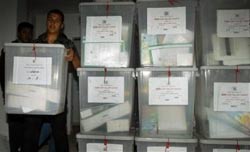
A Palestinian worker unloads ballot boxes for the Palestinian
Legislative Election at the Central Elections stores in Khan Younis camp in
southern Gaza Strip January 24. (Reuters)
The 34-year-old Fayeq Rajjab left his home in the Zaytoon neighborhood in the
Gaza City on early Wednesday and joined a queue of people outside a polling
station set up in the Zaytoon elementary school, waiting to cast his vote in the
first Palestinian legislative elections in a decade.
"I am very proud today to come to this polling station to cast my ballot and
elect new parliament members," he said. "It is a historic day for the
Palestinian people who have always been eager for democracy."
"The last parliament was elected some 10 years ago. We really need a change
and we really need to get out of the situation of chaos, lack of security, and
poverty. We want to choose a new leadership to help the people," Rajjab added.
The polling station opened at 7:00 a.m. (0500 GMT) as scheduled as about 1.43
million Palestinians are expected to head to the polls across the Gaza Strip,
the West Bank and Arab East Jerusalem to choose a new 132-seat parliament.
Electoral officials have expected a high turnout.
When asked which party or faction he had voted for, a beaming Rajjab
answered, "Of course, I voted for Hamas. Hamas is my choice and Islam is the
solution."
Another Palestinian voter said after casting his ballot in another polling
station in the Gaza City that he voted for the dominant Fatah movement, which he
praised for leading a historic Palestinian revolution and being capable to
strike a settlement of the decades-long Palestinian-Israeli conflict.
Supporters of Fatah and the Islamic Resistance Movement (Hamas), the two key
contenders in Wednesday's ballot, lined up major streets in the Gaza City in the
last push to woo voters, causing a traffic jam in downtown.
Wearing trademark green and yellow hats respectively, Hamas and Fatah
supporters distributed candidate lists to voters to tell them who to vote for.
But police confiscated the lists, which are seen as an electoral violation.
Meanwhile, Palestinian President Mahmoud Abbas cast his vote in the West Bank
city of Ramallah on Wednesday morning, calling for a smooth and quiet ballot.
Abbas also urged the Palestinians to actively participate in the elections
and "practice their sacred rights" of voting.
Abbas' Fatah movement is facing a grave challenge from Hamas, which has
gained ground in the run-up to the elections and is widely expected to do well
in its first parliamentary bid.
But Palestinian Information Minister Nabil Shaath sounded upbeat that Fatah
will achieve a great success.
Shaath made the remarks after he cast his ballot at a polling station in the
southern Gaza Strip town of Khan Younis.
"Fatah will win to be a strong cabinet," Shaath told reporters, adding that
"Hamas will win to be a strong opposition."
Palestinian Prime Minster Ahmed Qurei, who is also a member of Fatah's elite
Central Committee, said after voting in Arab East Jerusalem suburb of Abu Dis
that Fatah will respect the choice of the Palestinian people in the elections
and that Fatah will "stand behind Hamas" if Hamas wins.
Meanwhile, senior Hamas leader in the Gaza Strip Ismael Haneya, who heads
Hamas list in the elections, said that the group would not lay down arms even if
it emerged victor.
Voting centers will close at 7:00 p.m. (1700 GMT) and exit polls are expected
to come shortly afterwards.
Voters will choose 66 members of the new 132-seat parliament from 11 party
lists and the other 66 from over 400 candidates in local districts.
It is the second Palestinian legislative ballot. The first such voting was
held in 1996 and subsequent calls for holding parliamentary elections had not
been translated into action due to violence with Israel and stalled peace
efforts.
Heavily-armed Palestinian police were deployed across the territories to
protect the polling stations and the voting has proceeded smoothly so far.



